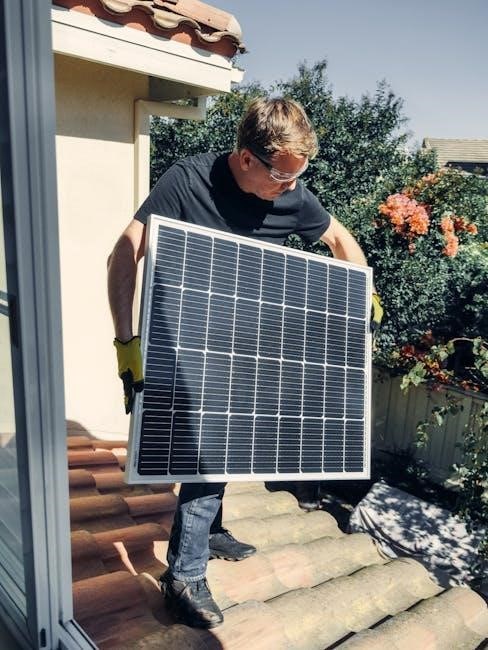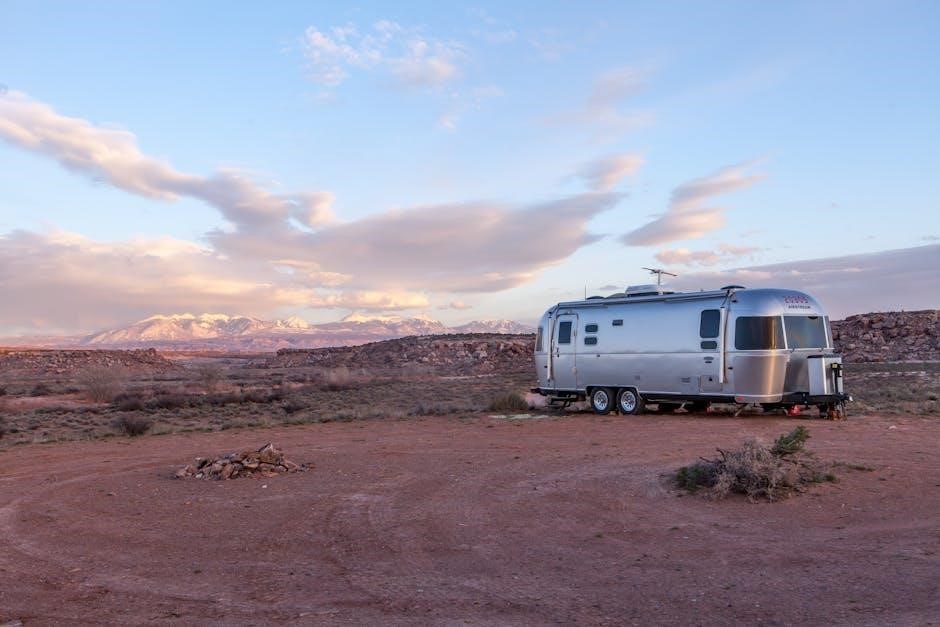RV generators are essential for reliable power during trips, but they can malfunction. Common issues include starting problems, low power output, and overheating. Troubleshooting ensures safety and optimal performance.
1.1 Understanding the Importance of RV Generators
RV generators are crucial for providing reliable power during outdoor adventures. They supply electricity for appliances, lighting, and HVAC systems, ensuring comfort and convenience. A functioning generator is essential for boondocking or when hookups are unavailable. It also powers safety systems, preventing power surges and electrical hazards. Regular maintenance and troubleshooting are vital to extend its lifespan and ensure uninterrupted energy supply while exploring remote areas.

1.2 Common Signs of Generator Malfunction
Identifying generator issues early is key to preventing breakdowns. Common signs include low power output, unusual noises, or failure to start. Overheating, error codes, or oil pressure issues can indicate internal problems. Additionally, flickering lights or electrical surges may signal malfunction. Addressing these signs promptly ensures safety and extends the generator’s lifespan, preventing costly repairs and unexpected power losses during trips.
1.3 Safety Precautions for Generator Troubleshooting
Safety is crucial when troubleshooting your RV generator. Always turn off the generator and let it cool before servicing. Ensure the area is well-ventilated to avoid carbon monoxide buildup. Never work on a running generator, and keep flammable materials away. Use proper tools and follow the manual’s guidelines. Disconnect power sources and ensure no electrical risks. Prioritize caution to prevent accidents and ensure a safe repair process.

Common RV Generator Problems
RV generators often face issues like failure to start, low power output, overheating, and unusual noises. These problems stem from fuel, electrical, or mechanical faults, requiring timely fixes.
2.1 Generator Won’t Start
If your RV generator won’t start, common culprits include low fuel levels, a dead battery, or faulty spark plugs. Clogged fuel lines, tripped circuit breakers, or insufficient oil can also prevent ignition. Always check the basics first, such as fuel availability and battery connections. If issues persist, inspect the air filter and starter motor for damage or wear. Addressing these problems early ensures your generator runs smoothly and reliably during your trips.
2.2 Low Power Output
A common issue with RV generators is low power output, which can prevent appliances from functioning properly. This problem often stems from a faulty alternator, clogged air filters, or overloaded circuits. Additionally, improper fuel-to-air mixtures or worn spark plugs can reduce efficiency. Check for blockages in the exhaust system and ensure the generator is not overloaded. Addressing these issues can restore your generator’s performance and ensure reliable power supply during your travels.
2.3 Overheating Issues
Overheating is a frequent problem in RV generators, often caused by blocked air intake vents, malfunctioning cooling systems, or excessive load. High temperatures can damage internal components and lead to shutdowns. Ensure proper ventilation, check for debris in cooling fins, and verify that the load does not exceed the generator’s capacity. Regular maintenance, such as cleaning air filters and inspecting hoses, can prevent overheating and extend the lifespan of your generator.
2.4 Strange Noises or Vibrations
Strange noises or vibrations in an RV generator can indicate mechanical issues. Common causes include loose belts, worn bearings, or internal component damage. Blockages in the exhaust system, such as a clogged muffler, can also produce unusual sounds. Vibrations may stem from misaligned parts or an unbalanced load. Addressing these problems promptly is crucial to prevent further damage. Regular inspections and maintenance can help identify and resolve these issues before they escalate.

Basic Troubleshooting Steps
Start by checking the fuel level, electrical connections, and oil. Ensure air filters are clean and free of blockages. These simple steps often resolve common issues quickly.
3.1 Checking Fuel Level and Quality
Always begin with the fuel system. Low fuel or contaminated fuel can prevent the generator from starting or running smoothly. Ensure the tank has enough fuel and check for dirt or water in the fuel lines. Old or degraded fuel can also cause issues, so regular draining and refueling with fresh, high-quality fuel is essential for optimal performance and longevity.
3.2 Inspecting Battery and Electrical Connections
Next, inspect the battery and electrical connections. A dead or weak battery can prevent the generator from starting. Check the voltage and ensure terminals are clean and secure. Loose or corroded connections can disrupt power flow. Test the starter motor and circuit breakers to ensure they are functioning properly. Faulty electrical components can cause intermittent or complete system failure, so thorough inspection is crucial for reliable generator operation.
3.3 Verifying Oil Level and Condition
Always check the oil level and condition before starting the generator. Low oil levels can trigger shutdowns, while dirty oil may damage the engine. Use a dipstick to measure the oil level and ensure it meets the manufacturer’s recommendations. Avoid overfilling, as this can cause operational issues. Replace the oil filter regularly and top up with the specified oil type to maintain optimal performance and extend the generator’s lifespan.
3.4 Examining Air Filters and Intake Systems
Air filters and intake systems play a critical role in generator performance. Dirty or clogged air filters restrict airflow, reducing efficiency and causing overheating. Inspect the filter for dust, dirt, or debris and clean or replace it as needed. Ensure the intake vents are free from obstructions like leaves or pests. A clean air system ensures proper combustion and prevents damage to the engine. Regular maintenance helps maintain optimal generator function during RV trips.

Advanced Troubleshooting Techniques
Advanced troubleshooting involves testing circuit breakers, checking fuel lines for blockages, analyzing error codes, and inspecting spark plugs for faults to diagnose complex generator issues effectively.
4;1 Testing Circuit Breakers and Fuses
Testing circuit breakers and fuses is crucial for identifying electrical issues in your RV generator. Start by locating the main circuit breaker and check if it has tripped. Reset it if necessary. Next, inspect all fuses, replacing any that are blown. Use a multimeter to test for continuity. Ensure all connections are secure to prevent power interruptions. This step helps resolve common electrical faults quickly and safely.
4.2 Diagnosing Faulty Spark Plugs
A faulty spark plug can prevent your RV generator from starting or running smoothly. Remove the spark plug and inspect for wear or fouling. Check the gap and clean or replace it if necessary. Use a spark tester to ensure the plug fires correctly. If no spark is present, the issue may lie in the ignition coil or wiring. Replace the spark plug if damaged and ensure proper installation for optimal performance.
4.3 Checking for Blockages in Fuel Lines
Blockages in fuel lines can disrupt your RV generator’s operation. Inspect the lines for kinks, dirt, or debris. Use compressed air to clear blockages or replace damaged sections. Ensure the fuel filter is clean, as a clogged filter mimics fuel line issues. Regularly maintaining fuel system components prevents such problems. Always consult your generator’s manual for specific guidance on fuel line inspection and cleaning procedures to ensure smooth operation and avoid unnecessary repairs.
4.4 Analyzing Error Codes and Blink Codes
Modern RV generators often display error codes or blink codes to indicate specific issues. Refer to your generator’s manual to decode these signals, as they vary by brand. For example, Onan generators use blink codes to signal problems like low fuel or sensor malfunctions. By analyzing these codes, you can identify the root cause and apply the appropriate fix, saving time and reducing the need for professional intervention. This step is crucial for effective troubleshooting and maintaining optimal performance.

Maintenance Tips for RV Generators
Regular maintenance ensures RV generators run efficiently and reliably. This includes oil changes, filter replacements, and professional servicing. Proper care extends lifespan and prevents unexpected breakdowns during trips.
5.1 Regular Oil Changes and Filter Replacements
Regular oil changes and filter replacements are crucial for maintaining your RV generator’s health. Old oil can degrade engine performance and lead to premature wear. Replace the oil every 50-100 hours of use and always use the recommended type. Air and fuel filters should also be checked and replaced periodically to ensure proper airflow and combustion efficiency. A clean filter improves fuel efficiency and reduces the risk of engine damage.
5.2 Scheduling Professional Servicing
Scheduling professional servicing for your RV generator is vital for its longevity and performance. Certified technicians can identify and address issues before they escalate, ensuring optimal functionality. Regular servicing includes thorough inspections, diagnostics, and necessary repairs. Many manufacturers recommend annual servicing or after a specific number of operating hours. Professional maintenance helps prevent unexpected breakdowns and extends the generator’s lifespan, providing peace of mind during your travels.
5.3 Proper Storage and Winterization
Proper storage and winterization are crucial to maintain your RV generator’s health. Drain fuel or stabilize it with additives to prevent spoilage. Disconnect the battery and store it in a cool, dry place to avoid drain. Cover the generator to protect it from dust and moisture. Winterization steps like checking antifreeze levels and sealing any openings prevent damage from freezing temperatures. Regular maintenance ensures your generator is ready for the next season.

Brand-Specific Troubleshooting
Brand-specific troubleshooting addresses unique issues for generators from Onan, Honda, Yamaha, Champion, and Generac. Each brand has distinct features requiring tailored diagnostic approaches to resolve problems effectively.
6.1 Onan Generator Issues and Solutions
Onan generators are popular in RVs but can experience issues like fault codes, low oil shutdown, and ignition problems. Solutions include checking oil levels, verifying fuel supply, and consulting the Onan service manual for specific fault codes; Regular maintenance and addressing common faults can ensure reliability and extend the generator’s lifespan for consistent power supply during trips.
6.2 Honda and Yamaha Generator Specifics
Honda and Yamaha generators are known for reliability but may encounter issues like faulty spark plugs or clogged air filters. Regular maintenance, such as oil changes and filter replacements, can prevent these problems. Troubleshooting steps include checking fuel levels, spark plug condition, and ensuring proper electrical connections. Their durable designs and efficient performance make them popular choices for RVs, with specific models offering unique features suited for different power needs.
6.3 Champion and Generac Generator Troubleshooting
Champion and Generac generators are durable but may face issues like low oil levels, clogged air filters, or tripped circuit breakers. Troubleshooting involves checking oil levels, examining air filters, and ensuring proper fuel flow. For Generac models, error codes can guide diagnostics, while Champion generators may require testing the spark plug and fuel lines. Regular maintenance, such as filter replacements and oil changes, is crucial for optimal performance and longevity of these units.

Electrical System Troubleshooting
Identify electrical issues by checking wiring, circuit breakers, and voltage output. Test for overloads, short circuits, and faulty connections to ensure safe and reliable power distribution in your RV.
7.1 Identifying Wiring and Circuit Issues
Begin by inspecting the wiring for signs of damage, corrosion, or wear. Check circuit breakers and fuses to ensure they haven’t tripped or blown. Verify connections between the generator and RV electrical panel are secure. Use a multimeter to test voltage at key points to identify short circuits or open wires. Faulty outlets or overloaded circuits can also cause electrical system malfunctions, requiring immediate attention to prevent further damage or safety hazards. Regular inspections can help prevent such issues from arising unexpectedly during your travels.
7.2 Testing Voltage and Current Output
Use a multimeter to measure the generator’s voltage and current output. Ensure the readings match the rated specifications in the owner’s manual. Low voltage or current may indicate faulty components like the alternator or capacitor. Verify that all electrical loads are within the generator’s capacity to avoid overloading. Abnormal readings could signal internal issues or worn-out parts, requiring professional inspection. Always test with the generator under a typical load for accurate results.
7.3 Checking for Overloads or Short Circuits
Overloads occur when too much power is drawn, tripping breakers or damaging the generator. Short circuits, caused by faulty wiring or connections, can spark electrical fires. Use a multimeter to test for short circuits between wires and ground. Check for blown fuses or tripped breakers. Verify that all appliances are within the generator’s capacity. Unplug non-essential devices and restart the generator to isolate the issue. Addressing overloads and shorts promptly prevents further damage to the electrical system.

Preventative Measures
Regular generator exercise, monitoring usage patterns, and inspecting for wear and tear help prevent issues. These steps ensure reliability and extend the generator’s lifespan during RV trips.
8.1 Regular Exercise and Usage Guidelines
Regular exercise of your RV generator is crucial for maintaining its health. Experts recommend running it with a load for at least 30 minutes every month. This helps prevent fuel degradation and keeps internal components lubricated. Always follow the manufacturer’s guidelines for usage to ensure optimal performance and longevity of the generator. Proper exercise routines can prevent unexpected breakdowns during trips, ensuring uninterrupted power supply.
8.2 Monitoring Usage Patterns
Monitoring your RV generator’s usage patterns is vital for preventing overloads and ensuring longevity. Track power consumption to avoid exceeding the generator’s capacity. Keep a log of peak usage times and adjust appliance usage accordingly; Regularly reviewing this data helps identify potential issues before they escalate. This proactive approach ensures efficient energy management and minimizes the risk of generator strain or failure during trips.
8.3 Keeping Tabs on Wear and Tear
Regularly inspecting your RV generator for wear and tear is crucial for maintaining performance and preventing breakdowns. Look for signs of worn belts, corroded connections, or leaking fluids. Check the air filter for dirt and the exhaust system for blockages. Addressing these issues early prevents major repairs and ensures the generator runs efficiently, providing consistent power during your RV adventures and extending its lifespan.

When to Call a Professional
Know when to call a professional for complex RV generator issues, such as interpreting error codes or addressing serious mechanical problems. Expert servicing ensures safety and efficiency.
9.1 Recognizing Complex Issues
Identify complex issues requiring professional expertise, such as persistent starting problems or fault codes indicating internal malfunctions. If basic troubleshooting fails, it’s crucial to consult a specialist to prevent further damage and ensure repairs are done safely and effectively.
9.2 Understanding Warranty and Repair Options
Familiarize yourself with your generator’s warranty terms to determine covered repairs. Check if issues are under warranty and locate authorized service centers. Understanding repair options helps minimize costs and ensures genuine parts are used, maintaining your generator’s reliability and performance over time.
9.3 Finding Reliable Service Providers
When professional help is needed, locate certified technicians experienced with RV generators. Check reviews, ask for recommendations, and verify certifications. Ensure the provider uses genuine parts and adheres to manufacturer guidelines. Reliable service ensures efficient repairs, extending your generator’s lifespan and maintaining its performance, crucial for uninterrupted power during your travels.